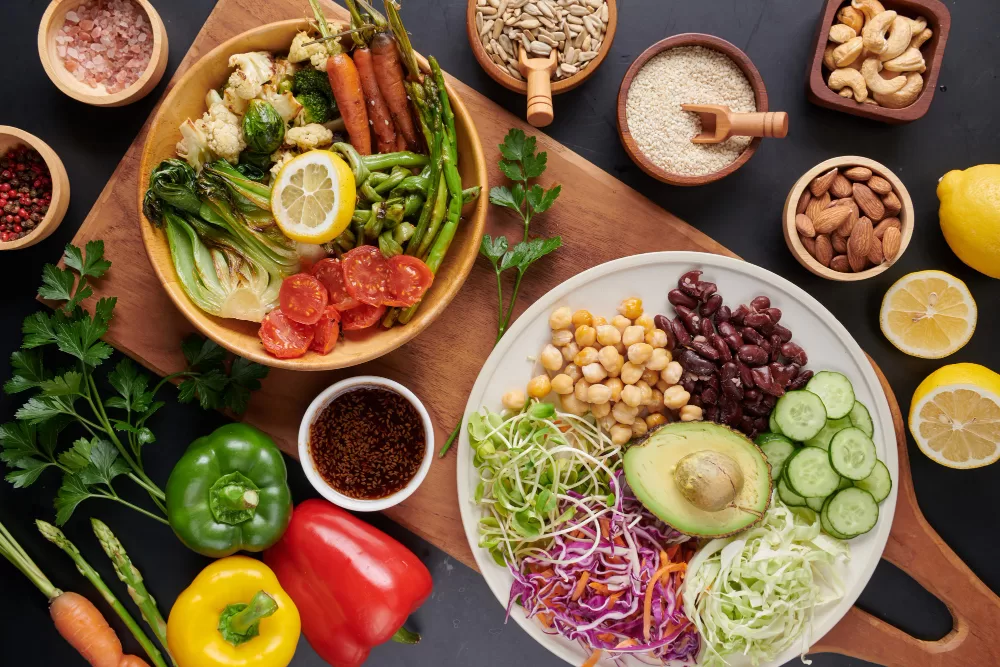
Top Vitamin-Rich Foods: Nutrition plays a crucial role in maintaining healthy skin, hair, and heart function. Beyond vitamin E, several other vitamins contribute significantly to overall health. Here, we detail foods rich in vitamins E, A, C, D, and K, which collectively support skin elasticity, hair strength, immune function, and cardiovascular wellness.
Table of Contents
Top Vitamin-Rich Foods
1. Wheat Germ Oil: A Powerhouse of Vitamin E
Wheat germ oil is one of the top Vitamin-Rich Foods that stands out for its exceptionally high vitamin E content, delivering 149.4 mg per 100 grams. This potent antioxidant helps protect skin from oxidative stress and supports immune function. Additionally, wheat germ oil contains small amounts of vitamin A, which promotes healthy vision and cell growth Livestrong.com My Food Data.
Usage Tip:
- Drizzle wheat germ oil over salads or add to smoothies to boost nutrition.
2. Sunflower Seeds: Vitamin E and Selenium Combo
Sunflower seeds provide 35.2 mg of vitamin E per 100 grams and are rich in selenium, a mineral that enhances antioxidant activity, reducing cellular damage. They also offer vitamin B6, crucial for brain health and neurotransmitter function
Usage Tip:
- Use sunflower seeds in trail mixes or sprinkle them on yogurt.
3. Almonds: Vitamin E, Magnesium, and Fiber
Almonds supply 25.6 mg of vitamin E per 100 grams. Additionally, they are high in magnesium, which supports nerve function and heart health. The fiber in almonds aids digestion, while healthy fats promote skin hydration and elasticity
Usage Tip:
- Snack on raw almonds or add almond slices to oatmeal.
4. Leafy Greens: A Nutritional Powerhouse
Leafy greens like spinach, kale, and Swiss chard provide a variety of essential vitamins:
- Spinach: 3.7 mg of vitamin E per cup, plus vitamin K for bone health and iron for energy production.
- Kale: Loaded with vitamins A, C, and K, essential for collagen production, immune support, and blood clotting.
- Swiss Chard: Rich in magnesium and vitamin E, promoting cellular repairLivestrong.com.
Usage Tip:
- Blend leafy greens into smoothies or sauté them with olive oil.
5. Red Bell Peppers: Vitamin C and Antioxidant Rich
Red bell peppers contain 3.3 mg of vitamin E per cup, but their high vitamin C content (192% DV) steals the show. Vitamin C is crucial for collagen synthesis, boosting skin health and protecting against oxidative damage. They also have beta-carotene, a precursor to vitamin A, supporting eye health
Usage Tip:
- Chop into salads or roast for a sweet, smoky flavor.
6. Butternut Squash: Beta-Carotene and Vitamin E
One cup of cooked butternut squash provides 2.6 mg of vitamin E and high levels of beta-carotene, which the body converts to vitamin A. This combination supports skin repair, immune function, and eye health. The squash also contains potassium, helping regulate blood pressure
Usage Tip:
- Roast with olive oil or add to hearty soups.
7. Avocados: Fat-Soluble Vitamins Galore
A single avocado delivers 4.2 mg of vitamin E, plus heart-healthy monounsaturated fats that improve the absorption of vitamins A, D, E, and K. Avocados also contain vitamin K and folate, promoting brain and bone health
Usage Tip:
- Make guacamole or add slices to sandwiches and salads.
8. Kiwi: A Vitamin C and E Combo
Two kiwis provide 2.6 mg of vitamin E and a whopping 200% DV of vitamin C. The antioxidants in kiwi help reduce oxidative stress, support immune health, and promote radiant skin. It also provides fiber for digestive health
Usage Tip:
- Add kiwi to fruit salads or blend into green smoothies.
9. Broccoli: Nutrient-Dense and Versatile
Broccoli is a cruciferous vegetable loaded with vitamins C, E, and K. One cup of cooked broccoli offers 15% DV of vitamin E and over 100% DV of vitamin C. Vitamin K in broccoli plays a crucial role in bone health and wound healing
Usage Tip:
- Steam and drizzle with olive oil, or use in stir-fries.
10. Salmon: Omega-3s, Vitamin D, and Selenium
Salmon is not just a protein powerhouse; it is rich in vitamin D, which supports bone health and immune function. It also provides omega-3 fatty acids, essential for heart health, and selenium for thyroid function
Usage Tip:
- Grill salmon fillets with herbs or use in poke bowls.
11. Eggs: Complete Nutrition in a Shell
Eggs are one of the few foods containing vitamin D naturally, supporting bone and immune health. They also have vitamin B12, essential for brain function, and choline, crucial for cell membrane integrity
Usage Tip:
- Make scrambled eggs or a hearty vegetable frittata.
Eating a diet rich in these vitamin-packed foods can significantly boost skin, hair, and heart health. Incorporating a variety of sources ensures a balanced intake of fat-soluble and water-soluble vitamins, along with essential minerals and antioxidants. Prioritize these nutrient-dense options to support your overall wellness and look radiant from within.
Q&A on Vitamin-rich foods
Q1: What are some vitamin-rich foods that can improve skin health? A: Foods like avocados, red bell peppers, and almonds are rich in vitamins E and C, which promote skin elasticity and protect against oxidative damage. Leafy greens, loaded with vitamins A and K, also help keep your skin glowing and healthy.
Q2: How can vitamin-rich foods contribute to heart health? A: Vitamin-rich foods such as salmon, packed with vitamin D and omega-3 fatty acids, and almonds, high in vitamin E and healthy fats, are excellent for heart health. These nutrients work together to reduce inflammation and lower bad cholesterol levels, protecting against heart disease.
Q3: Which vitamin-rich foods are best for strong hair? A: Vitamin E-rich foods like sunflower seeds and almonds nourish the scalp and strengthen hair. Additionally, vitamin A from sweet potatoes and beta-carotene-rich butternut squash promotes hair growth and a healthy scalp.
Q4: Are there vitamin-rich foods that support the immune system? A: Yes, foods like kiwi and red bell peppers, loaded with vitamin C, and eggs, a natural source of vitamin D, are fantastic for boosting immune function. Vitamin C enhances white blood cell production, while vitamin D plays a crucial role in fighting off infections.
Q5: How can I include more vitamin-rich foods in my diet easily? A: Incorporate avocados in your salads or smoothies, add spinach to omelets or soups, and snack on almonds or sunflower seeds. Cooking with olive oil and using red bell peppers in stir-fries or as a snack are also simple ways to boost vitamin intake.
Q6: What are some vitamin-rich foods that provide multiple benefits for overall wellness? A: Leafy greens like spinach contain vitamins A, C, E, and K, supporting skin, bone, and heart health. Broccoli offers a mix of vitamin C, K, and fiber, benefiting the immune system and digestion. Eating a diverse range of these foods can address multiple nutritional needs.
More Reads:
Healthy and Tasty Smoothies for Your Weight Loss Journey: 10 Recipes to Try Now
10 Easy and Healthy Mediterranean Diet Recipes for Any Meal


